
Custom Limericks and Poetry Services
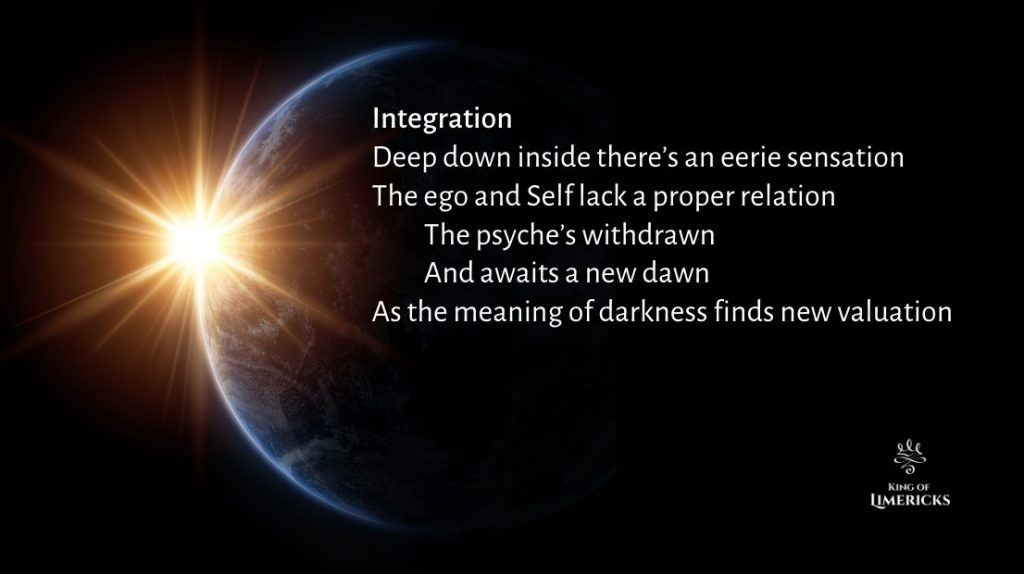
Limericks and Synchronicity
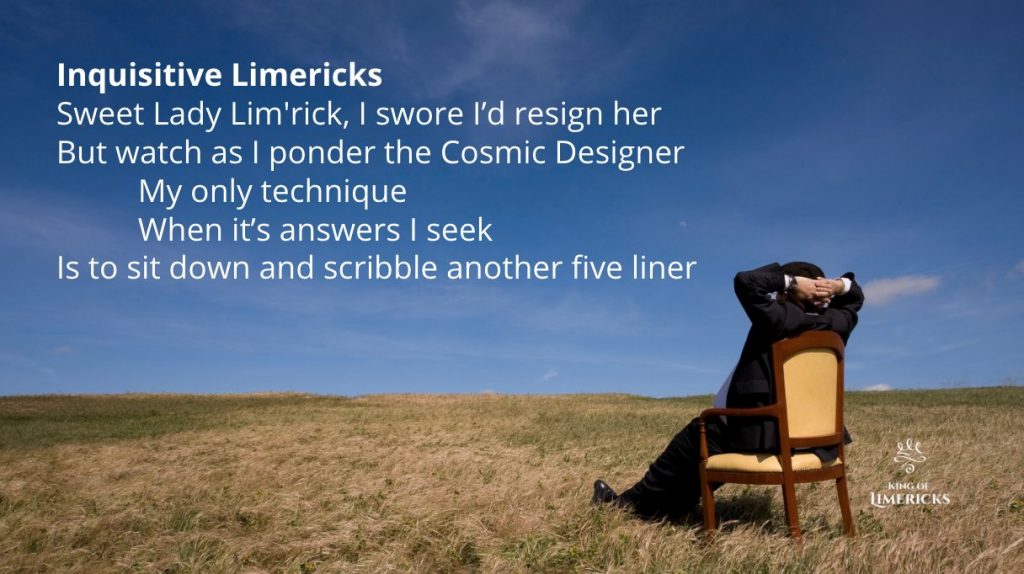
You might have already missed National Haiku Poetry Day, which occurred last month, on April 17th. But don’t let National Limerick Day pass you by. That would be a literary let down, or a travesty of letters. Either way, it only comes once a year, so be ready to catch it when it falls on Wednesday, May 12.
National Limerick Day takes place each year on May 12, coinciding with the birthday of Edward Lear, a renowned producer of limericks. Lear (May 12, 1812 – January 29, 1888) was an English illustrator, musician, and perhaps most famously, the author of several collections of children’s poetry. While he may not have invented the poetic form we now call the limerick, his Book of Nonsense certainly popularized it. More widely observed in the United Kingdom, this semi-obscure day of national awareness recognizes Lear’s contributions to modern poetry and the enduring cultural importance of this whimsical, rhyming genre.
Why National Limerick Day?
The limerick is something of a cultural treasure, an icon of national heritage. It remains one of the most popular forms of poetry, with a rigid yet easy-to-follow format. The limerick consists of just five short lines in an A-A-B-B-A rhyme scheme. Strictly speaking, the poem follows an anapest meter, with two short syllables followed by an accented syllable. Traditionally, lines 1, 2 and 5 have nine syllables, while lines 3 and 4 have six syllables. But the exact number of syllables can vary, so long as the galloping meter is maintained. Da-da-DAH, da-da-DAH, da-da-DAH!
The structure is relatively simple, but it lends itself so well to a whimsical, light-hearted message. It surely served Ed Lear well with his hundreds of children’s verses. Later, and more famously, the limerick was adopted for poetry of a more prurient and sexually explicit nature. Perhaps this off-color usage is what has helped the limerick to retain its popularity, even as Homeric Hymns and Petrarchan sonnets fall by the wayside.
The Nationality of the Limerick
There’s a certain irony in the fact that we even have a National Limerick Day. That’s because the actual nationality of the limerick remains a subject of some debate. The playful poetic genre takes its name from a county and city in the Republic of Ireland. In Lear’s time, prior to 1922, however, the country we now call Ireland belonged to the United Kingdom of Great Britain and Ireland.
More importantly, Edward Lear, was an Englishman, born in Middlesex. He lived, worked and wrote primarily in England, and also traveled extensively. But he has no significant affiliation with Ireland. What’s more, he never referred to his five-line rhymes as limericks. This name didn’t catch on until the 1880s or 1890s, presumably when poets of the Irish Revival, or the Celtic Twilight, appropriated Lear’s form for their own sordid purposes.
Today we associate this manner of poetry with its name place, in Ireland. But, in fact, the limerick was not born in Ireland.
EDITORIAL NOTE: In America, it seems like we all pronounce ‘limerick” with two syllables. But in the United Kingdom it normally has three. It doesn’t make much difference, unless — like me — you’re writing poetry and you’re hyper-sensitive about the meter. Therefore, out of an abundance of caution, I write “lim’rick” to be clear about it only having two syllables.
Edward Lear, inventor of limericks?
Lear was a man of many artistic talents, visual, musical and literary. So it’s somewhat amusing to find that he is best-remembered for his limericks, specifically The Book of Nonsense (1846). The fact is, his poems were not called limericks in his own lifetime. And it’s highly unlikely that he originated the form. But there’s no doubt, he did produce hundreds of them, and he managed to bring great attention to the genre.
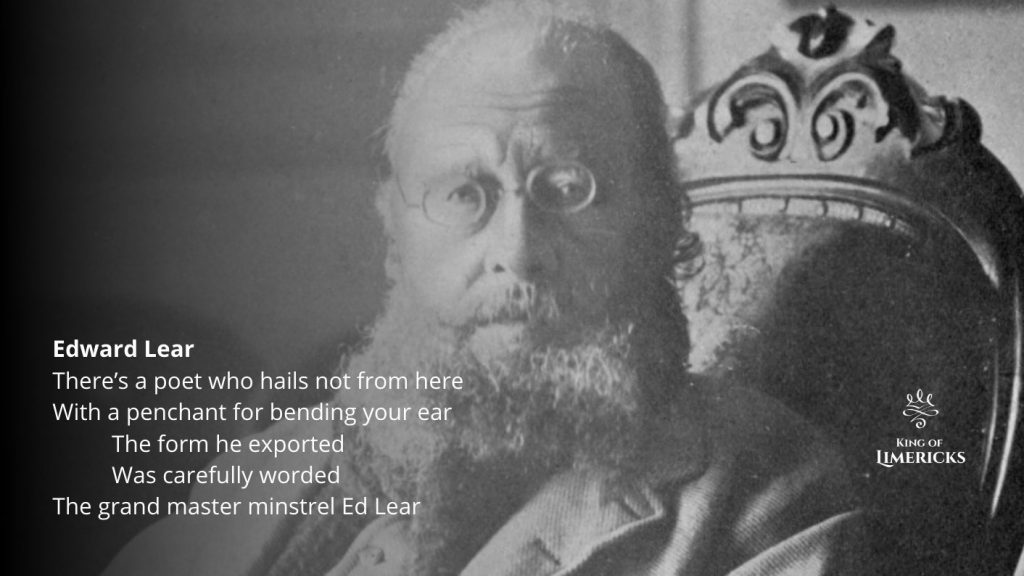
Over the years, there has been no lack of wild speculation as to who wrote the first limerick. Many want to give credit to Shakespeare. The Bard contributed so much to the English language, it’s only natural to think he must have written a few limericks on the side. And there’s a passage in Othello, a short drinking song, that sounds an awful lot like a limerick. Indeed, the song even seems to break from the iambic meter so religiously upheld through the rest of the drama.
Another theory posits Thomas Aquinas, the medieval monk and Christian philosopher, as the author of the first limerick. This idea is rather far-fetched, and Aquinas was writing in Latin, but it’s an amusing possibility to consider.
The evolution of limericks
While the origin of the limerick remains a question we can’t thoroughly answer, we can identify a clear arc in the history of the limerick. In the mid-1800s, Mr. Lear brought the form into the spotlight as a vehicle for whimsical and nonsensical nursery rhymes. If there was ever an occasion for “good, clean, family fun,” this was it.
Toward the end of Lear’s life, however, in the final decades of the 19th century, some clever iconoclasts — presumably Irishmen — got hold of the five-liner and discovered its great potential for indecency. And by some act of literary mystery, the dirty limerick was born. For the next hundred years or more, this lewd genre made its way through pubs and locker rooms. Chances are, you’ve seen, or maybe even written one, somewhere behind the door of a bathroom stall.
But this is a new era we live in. This is post-patriarchy. The hey day of lewd limericks is winding down. The demand for light-hearted wit isn’t going away, but our species needs less smut and more spirit. That’s part of why I’ve spent the last dozen years writing limericks that explore deeper questions and higher possibilities. I’m convinced that limericks can deliver something far more enriching than just dirty-minded double entendre, but still in a way that brings a knowing smile to your face.
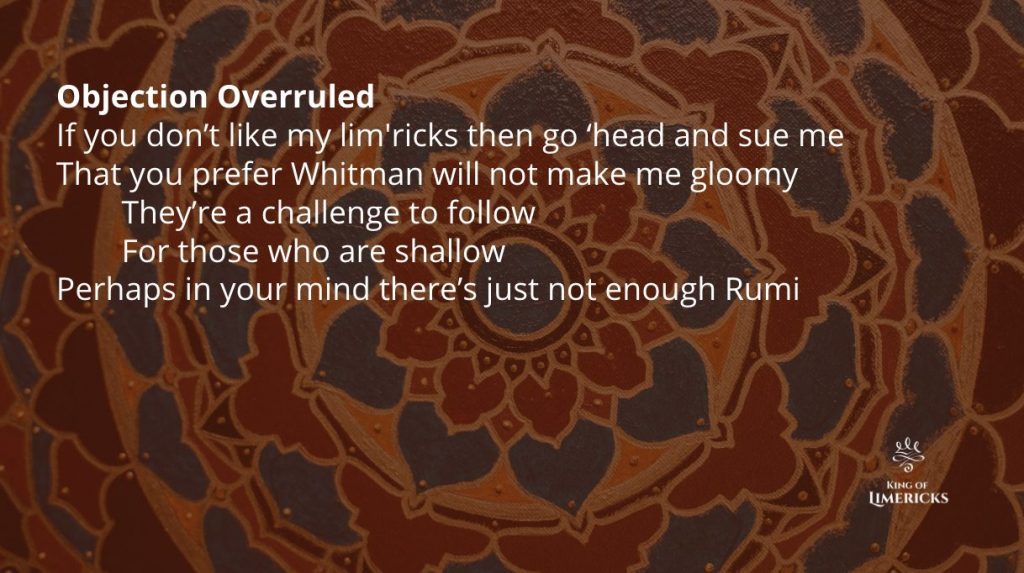
Further Reading
If you enjoyed learning about National Limerick Day, please consider sharing the post or subscribing to the blog. You might also want to check out some of these popular articles:
- 11 Inspiring Limericks
- 13 Educational Limericks
- 10 Honey-Tongued Limericks about Shakespeare
- Therapeutic Limericks about Mental Health

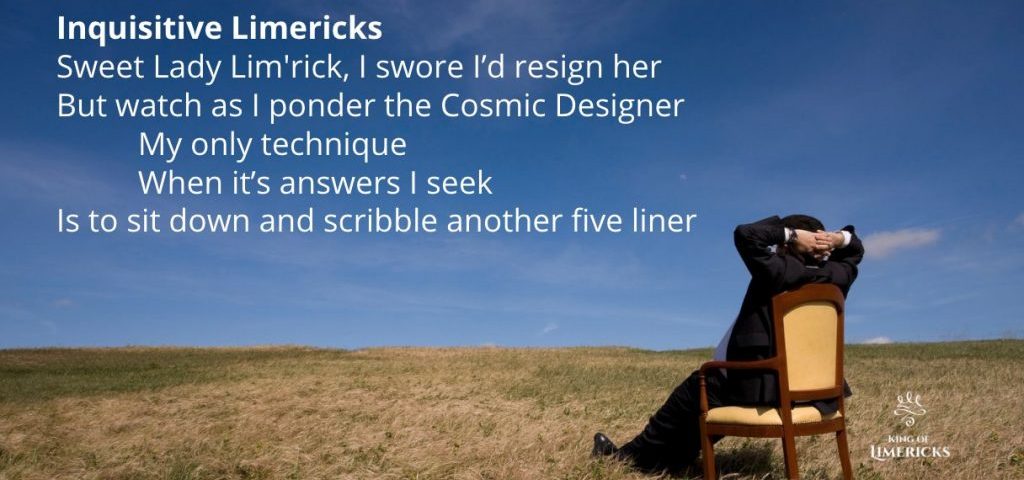
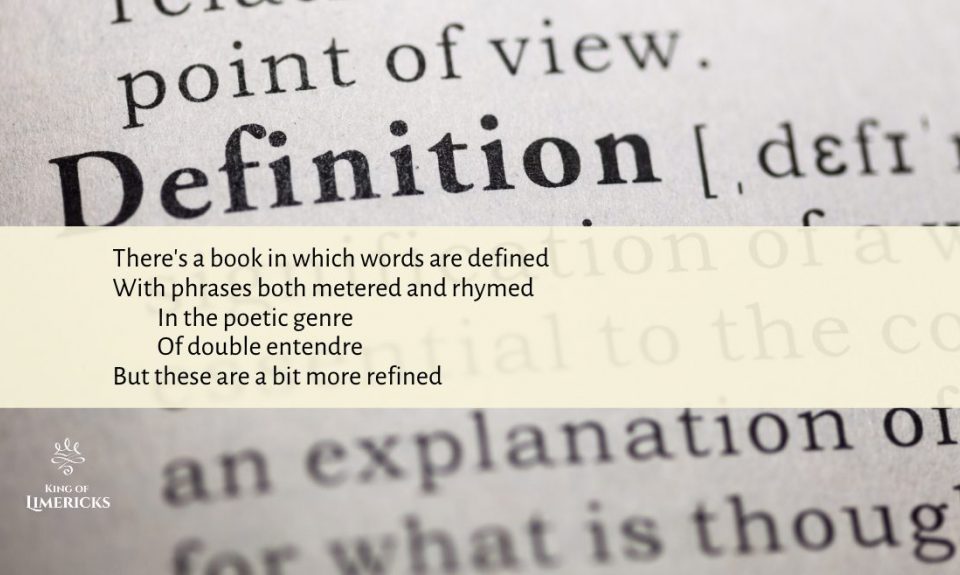
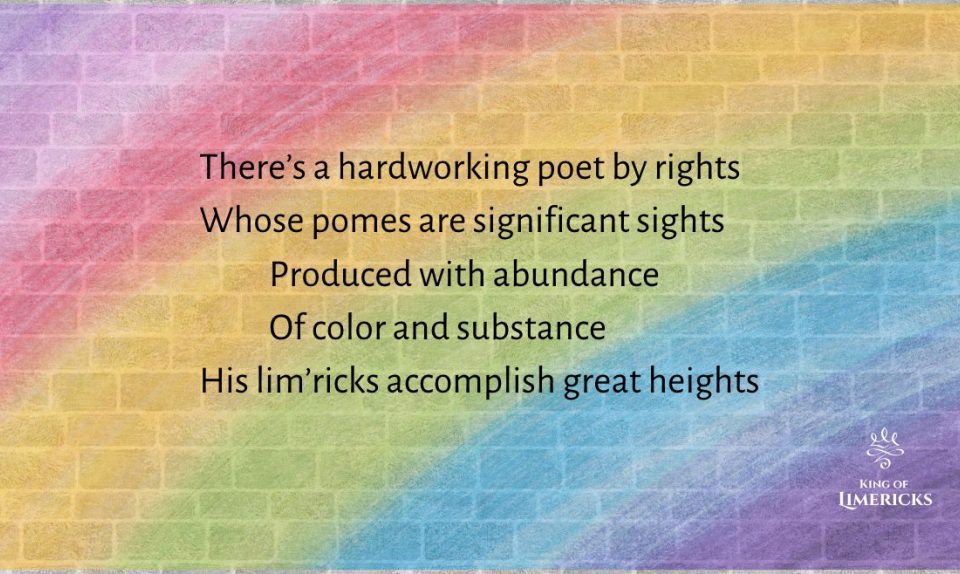
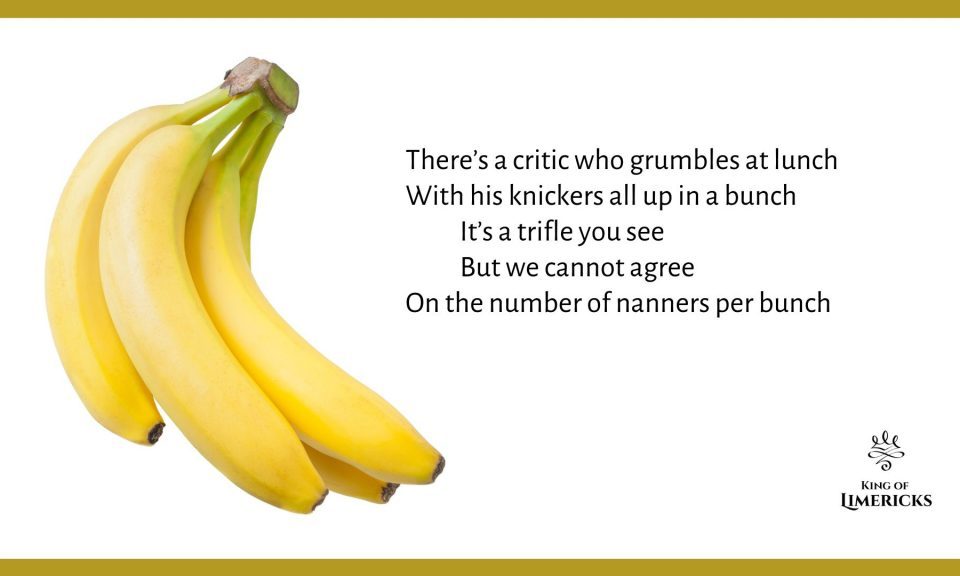
2 Comments
Hi Fred, love your work! I’ve just mentioned you and your website on my podcast, The Writing Guy (anchor.fm/scott-keyser), today being National Limerick Day an’ all.
Best wishes
Scott
Thank you, Scott. Happy Limerick Day to you, too!